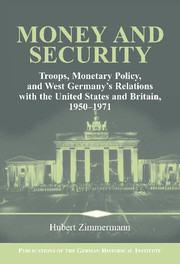 Money and Security
Money and Security Book contents
- Frontmatter
- Introduction
- 1 On Whose Shoulders? German Rearmament and the Cold War Burden
- 2 The British “New Look” and Anglo-German Relations
- 3 Adenauer and “Perfidious Albion”: Troop Reductions, Support Costs, and the Integration of Europe, 1957-1959
- 4 The Radford Plan: America and Its Troops in Germany, 1955-1958
- 5 The Political Economy of U.S. Troop Stationing in Europe
- 6 Offset and Monetary Policy During the Kennedy Administration, 1961-1962
- 7 The Bargain Slowly Unravels: Offset, Troop Reductions, and the Balance of Payments, 1962-1965
- 8 The Culmination of the Burden-Sharing Conflict: Chancellor Erhard’s Visit to Washington in September 1966
- 9 The Trilateral Negotiations of 1966-1967
- Conclusion
- Appendices
- Bibliography
- Index
8 - The Culmination of the Burden-Sharing Conflict: Chancellor Erhard’s Visit to Washington in September 1966
Published online by Cambridge University Press: 05 January 2013
- Frontmatter
- Introduction
- 1 On Whose Shoulders? German Rearmament and the Cold War Burden
- 2 The British “New Look” and Anglo-German Relations
- 3 Adenauer and “Perfidious Albion”: Troop Reductions, Support Costs, and the Integration of Europe, 1957-1959
- 4 The Radford Plan: America and Its Troops in Germany, 1955-1958
- 5 The Political Economy of U.S. Troop Stationing in Europe
- 6 Offset and Monetary Policy During the Kennedy Administration, 1961-1962
- 7 The Bargain Slowly Unravels: Offset, Troop Reductions, and the Balance of Payments, 1962-1965
- 8 The Culmination of the Burden-Sharing Conflict: Chancellor Erhard’s Visit to Washington in September 1966
- 9 The Trilateral Negotiations of 1966-1967
- Conclusion
- Appendices
- Bibliography
- Index
Summary
the mcnamara-hassel meeting of may 1966
At no point in its long and convoluted history did the troop-cost conflict become visible to the public with such spectacular consequences as during Chancellor Ludwig Erhard's desperate mission to Washington in September 1966. All the problems embedded in the never-ending controversy about the sharing of the conventional defense burden in Europe emerged and reinforced each other, resulting in a postwar low in German-American and German-British relations. In hindsight, the failure of Erhard's visit seems almost inevitable. Why did offset become such an explosive issue? The reasons for the inability of politicians on all sides to defuse the bomb in time are central to the understanding of transatlantic relations in the 1960s.
The offset crisis did not come as a bolt from the blue. Most German experts concerned with the execution of the offset agreements knew, even in early 1965, that a continuation of full offset through German purchases of American weapons after 1967 was practically impossible. Furthermore, it soon became apparent that even the targets for 1965-7, agreed on in the Hassel-McNamara protocol of 1964, would be reached - if at all - only by counting nonmilitary purchases or other substitutes. This was something the Americans had always resisted. During a cabinet meeting in March 1966 German ministers together with Bundesbank officials, who now took part in the deliberations concerning offset, noted that without a federal supplementary budget later in the year it would be impossible to honor the agreement with the United States.
- Type
- Chapter
- Information
- Money and SecurityTroops, Monetary Policy, and West Germany's Relations with the United States and Britain, 1950–1971, pp. 171 - 208Publisher: Cambridge University PressPrint publication year: 2002
